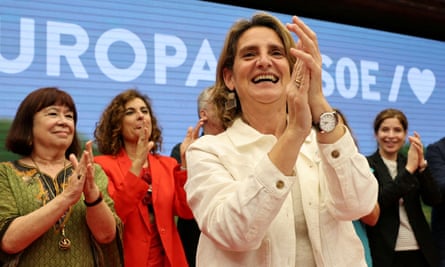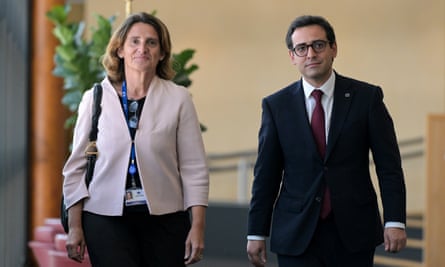
At the beginning of May, Teresa Ribera sounded the alarm over the future of the EU, warning that war, discord, disinformation, social media manipulation and the increasing normalisation of the far right had put the European project at risk of “an implosion”.
It did not help centrist political unity, Spain’s environment minister added, that some people – namely the European Commission president, Ursula von der Leyen – were refusing to rule out working with rightwing and far-right nationalists.
“I think that’s very worrying and, up to a certain point, it was a betrayal,” Ribera told the Guardian.
Fast forward four months and Ribera finds herself uniquely placed to help rebalance and revitalise the European Commission. The 55-year-old socialist, a veteran climate campaigner who also serves as one of Spain’s three deputy prime ministers, will be one of the most powerful people in Brussels when the next European Commission takes office later this year.
Despite her somewhat unwieldy job title – executive vice-president of a clean, just and competitive transition – Ribera will oversee a hugely influential portfolio and will also be one of the most senior socialists at the top of a more right-leaning EU executive.

One of six executive vice-presidents, she will share responsibility with France’s commissioner, Stéphane Séjourné, for creating a “clean industrial deal” within the first 100 days of taking office. Details remain scant, but the project is intended to accelerate growth of Europe’s green companies as the EU seeks net zero greenhouse gas emissions by the middle of the century.
The Spanish commissioner, who speaks English and French, will also take charge of EU competition policy, traditionally one of the most powerful fiefdoms in Brussels, with an instruction to make the EU rulebook that restricts mergers and government subsidies more compatible with the green transition. Competition is “a key portfolio in the transition”, a senior commission official said.
But the complex cat’s cradle of lines of responsibility devised by von der Leyen means Ribera will share the green transition job with several colleagues. Notably, the Dutch centre-right commissioner for climate, Wopke Hoekstra, will have the crucial task of proposing the EU’s 2040 climate reduction targets, which will determine the trajectory towards net zero.
Insiders say the profusion of overlapping portfolios means only one person is in charge: von der Leyen herself. “The problem that Ribera has in my view is that she has a super big portfolio,” said one EPP source, noting that Ribera shared responsibility with Séjourné for the clean industrial deal, meaning that von der Leyen “will do the arbitrage”.

But Ribera, who has a law degree and a diploma in constitutional law and political science, is unlikely to be daunted – or to allow herself to be sidelined. As her comments in April showed, her polite and personable manner belies a determination to speak her mind, especially when it comes to politics, the environment and the politicisation of the environment.
In another interview with the Guardian almost two years ago, she bemoaned Rishi Sunak’s failure to commit to fighting the climate emergency, while earlier this year she lamented what she termed the “climate change denialism and delayism” exhibited by the CEO of the Spanish energy company Repsol.
She has also accused the conservative regional government in Andalucía of engaging in “short-term electoral demagoguery” and playing into the hands of the far right by seeking to press ahead with irrigation plans for strawberry farms that could threaten the survival of one of Europe’s most important wetlands, the Doñana Natural Space.
And yet, as the row over the Doñana shows, Ribera is also a pragmatist and a deal-maker: seven months after calling out the behaviour of the Andalucían government, she and its regional president reached a landmark €1.4bn (£1.2bn) investment agreement to help protect the area and diversify the local economy.
In an interview with El País on Thursday, the executive vice-president-designate was keen to stress her record and her commitment to dialogue and cooperation.
“The commission is a collegiate body; it’s about shared power,” she said. “On the one hand, you have the coordination tasks on the green agenda; on the other, the traditional and powerful portfolio that is competition. Taken together, these areas are very powerful: what we need to do now is start on the kind of team work that will get them to take off. In my career, I’ve always tried to build consensus between north and south, between developed and developing countries. That’s where I feel comfortable. That’s the path.”

If Ribera’s departure to Brussels will be a loss to the government of Pedro Sánchez – she is a close ally of Spain’s socialist prime minister – it will also serve as proof of her country’s growing presence in European institutions.
The former Spanish foreign minister Josep Borrell may be reaching the end of his turbulent tenure as the EU’s chief diplomat, but Sánchez’s former economy minister, Nadia Calviño, is the president of the European Investment Bank and Iratxe García, a member of Sánchez’s Spanish Socialist Workers’ party, remains the leader of the Progressive Alliance of Socialists and Democrats group in the European parliament.
Congratulating Ribera on her designation on Tuesday, Sánchez wrote: “With your nomination, Spain achieves the highest level of influence it’s ever had in Brussels and the EU gains an exceptional leader. We’re really going to miss you.”
 Print
Print


